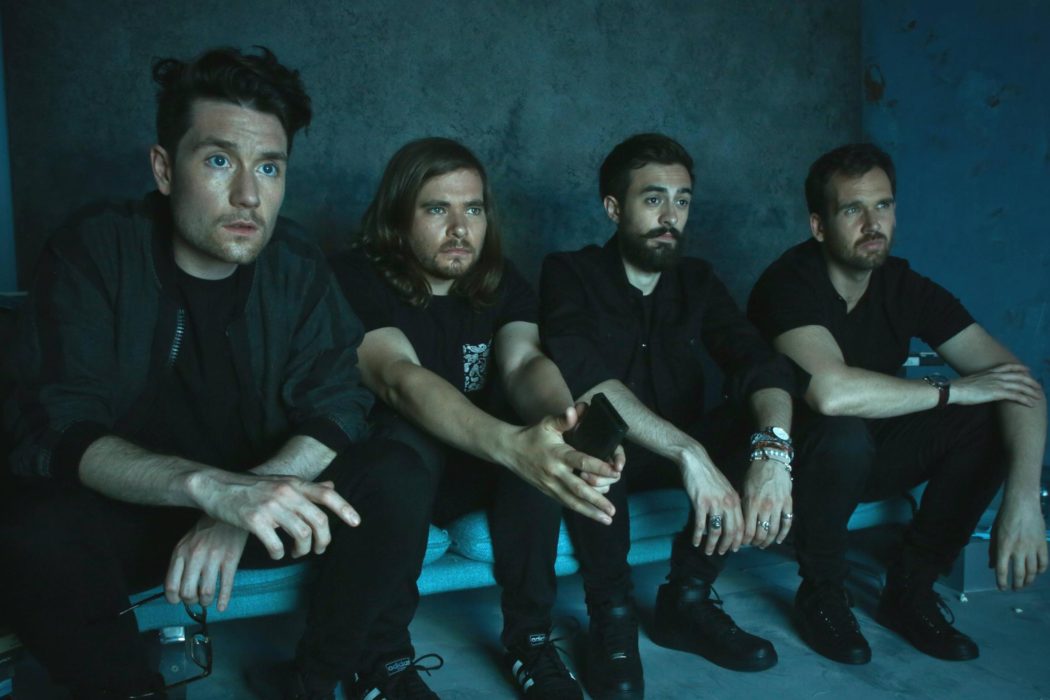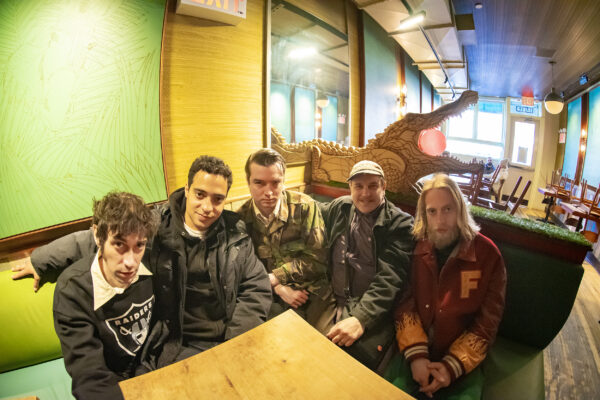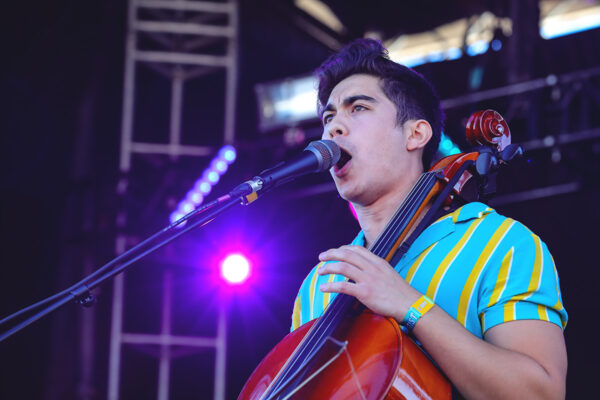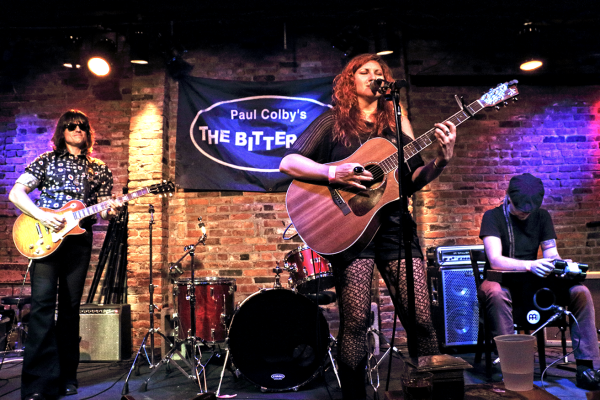Kyle Simmons (keyboards) of Bastille spoke to us ahead of the band’s show at Barclays Center in support of their sophomore album, Wild World. We spoke about the shift between Bad Blood and Wild World, what makes people gravitate towards the English group’s music, and what Kyle would do if he saw himself on the street five to six years ago- cross the street and get out of his way.
Kyle: First of all, great name by the way.
P&W: Thanks, I can’t take credit for that one, but they are two of our favorite things. It’s great too – sometimes people send whiskey for us to taste.
Kyle: What?! I’m in the wrong business apparently.
P&W: I’m sure you get some good perks as well. But maybe you should do some guest writing for us so you get some of the whiskey perks.
Kyle: Yeah, yeah, yeah.
P&W: So jumping into the albums, I noticed there was a shift in tone between Bad Blood and Wild World. How was your approach different in crafting the second album and if there’s one message you’re trying to get across, what is the message?
Kyle: The main difference is the first one was written in Dan’s bedroom and was about growing up and finding your place in the world. Wild World is a combination of “okay so I’m here” and how to deal with all the shit that’s happening at the minute. It was taking everything in and digesting it and then responding to all kinds of craziness happening in the world and how it’s portrayed in the media. You get this kind of media feed through the telly or whatever kind of social media stuff and it’s really how to respond to it all and that was the basis. When “Warmth” was written and it had the lyrics “wild, wild world” it was like, yeah that’s what it is kind of about. There’s a lot of shit going on and how to respond. There are also good elements – friendships and families and stuff – so it’s not all doom and gloom.
P&W: That’s one thing I find interesting about your music. It’s as if you’re telling a bunch of stories, but it’s not necessarily your personal story about this one breakup or one experience and you have these characters, like with “Blame,” that are operating in different stories and it’s a really interesting approach. Do you find it easier to tell someone else’s story or is there some other reason that you use this approach?
Kyle: I’m not really sure. I guess it’s a lot easier – well you get a lot of people who write about hard times and troubles and things they go through, and we find it more interesting to write about characters and themes and not always talk from personal experience. We obviously can draw on personal experience because a lot of things happen to us and we can use those themes but it’s more interesting to write about gangsters, like in “Blame.” When you write about yourself you have to make it very clear about what you’re talking about. When you write from an outsider’s perspective you can leave things more open and then listeners are able to project their own feelings and thoughts onto it. In some ways it’s nice because they can say what they think the song is about and then when you ask someone across the planet and they say something completely different. It is something we really like with our songs. People are able to understand them in different ways which is really important to us – a different experience for everyone really.
P&W: It almost gives them an ability to interact with the music more and not just be told what to think, which is interesting. So often a song presents a message and the artist is like take it or leave it, so I find this approach admirable.
Kyle: Awesome. Yeah.
P&W: There are some aspects of Wild World that remind me of Muse’s most recent album, where they have talking points or clips inserted into songs. I like how you guys integrated news clips and talking into the music and I’m curious what made you include the clips.
Kyle: That came from these mixtapes that we did. We took different clips from songs and combined them in a hip-hop mixtape kind of fashion. We sampled a lot of things and we thought the next album may flow more with these so each song is literally broken up like a scene from a film or some kind of documentary that helps set the scene of the song. It’s imagery to help you understand the song. Just trying something new, or for us it’s new, for the album.
P&W: Very cool. Talking about “Good Grief”- over 100 million streams globally – what do you think it is about your music that makes people gravitate towards it?
Kyle: Dan has this way of – well first he doesn’t really write optimistic music. He isn’t talking about having fun or partying or being in clubs and stuff. He mainly gravitates towards the darker side. But musically, he likes hooks and rhythms and melodies and has this way of combining the dark lyrical side with an upbeat happy side. Songs are literally about the weight of living and responsibility. With “Good Grief” it’s the same. It’s about death, but it’s framed in a contrasting way; in a really happy, upbeat pop song. It’s the same with “Pompeii,” you’re drawn to it. It’s charging and upbeat but when you set the lyrics down it’s a song about two ashy corpses lying there and looking back at their lives and thinking was it worth it? It’s a more interesting way to write – you can write a sad song with sad lyrics, but if you write a sad song and flip it and have a pop-like theme it’s a nice contrast.
P&W: Transitioning to more of the performance aspect, what has it been like to go from the supporting band to the headliner?
Kyle: Obviously it’s nice that people care enough so we can play big shows around the world. When you’re supporting, a lot in the crowd aren’t there for you; they’re happy to listen to your music, but they’re there for the headliner. It’s kind of the same with festivals. You need to be aware that people aren’t necessarily there to see you. It’s nice to do these kind of headlining shows where we can take the music from records and get it to the point where we can play it in a massive theatre or arena. We had some other musicians come play with us, like Charlie, and it adds another element to the show for people to enjoy. It’s amazing… and also greatly terrifying.
P&W: Well you guys fooled us.
Kyle: Well yeah, but there’s a lot more people to potentially play the wrong note in front of. But obviously it’s very nice and we’re so happy to have gotten to this point. We hope it continues.
P&W: We do too. Now, do you guys have a preference for large stages versus small stages or festivals?
Kyle: You can play on a festival stage and play for 50,000 people, which is unbelievable to a point. When you play to that scale it’s hard because your brain can’t comprehend it. When you play a smaller show of 200 people and you can see all of their faces, it is way more intimate. Both have their pros and cons. The last time we came to America we played a lot of venues we first played when we came to America like Bowery Ballroom. It was so nice to play all these places we hadn’t played at in ages and all the people there were like super fans. I’d like to do that again if we can get a show.
P&W: I really hope you do. I couldn’t believe you were playing that venue and then being there was surreal. I was thinking I’d only see you again on a festival stage or at Barclays or something so definitely pushing for another small venue show.
Kyle: Noted. We’ll see what we can do.
P&W: If you could go back in time five to six years, what advice would you give yourself today?
Kyle: I dunno because if I give myself advice it would change the outcome and as far as it goes the outcome has been pretty sweet. If I went back in time I’d probably stay out of my way. What’s happened at the minute is amazing. I couldn’t be in a better situation – I have the most ridiculous job in the world. It’s like in Back to the Future, you can’t go back and talk to yourself because that will change the ultimate course of the future. If I see myself I’d cross the street and stay away.
Article: Alx Bear





PANCAKE PICKS - THE BEST SHOWS OF THE WEEK FOR 3-28-17 - Pancakes And WhiskeyPancakes And Whiskey
[…] @ Barclays Center – We interviewed Kyle from the band last week and if you hit this gig, you definitely wont be […]